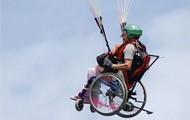All They Need Is Dignity
I first met Professor Michael Stein at the end of 2010. Around that time, I had been told by the American Embassy I had been admitted to the Fulbright program and that my next step was to look for schools I could get into. As chance would have it, Prof. Stein came to the Wuhan University law school and gave a speech about the “Convention on the Rights of Persons with Disabilities”— a topic entirely new to me at the time. At a dinner after the event, I quickly went up and introduced myself, hoping he could personally tell Professor Alford about my strong desire to study at Harvard. In a gentle voice, Prof. Stein sat up in his wheelchair and said in a barely audible tone, “don't worry, you can go to Harvard.”

While Prof. Stein was in Wuhan, I saw him riding in an ordinary car and staying in a hotel that had no elevator. I noticed he ate and drank little during events, and surmised it must be inconvenient for him to use the restroom.
In fact, I have been to the United States many times and have seen that handicap-friendly facilities can be found everywhere. Aside from the quiet sense of relief that comes with it, I didn't have any sort of profound awareness about such unlimited mobility for handicapped persons. After arriving at Harvard and taking Prof. Stein's class, “The Rights of Persons with Disabilities,” I understood much more.
Truly, for a disabled person to become a professor at Harvard shows Prof. Stein's strength. Does it perhaps also show the accepting nature of Harvard?
The professor teaching class sat in a wheelchair. Three students sat in wheelchairs as well— one was from China. During class, the student that struck me most was a girl with light black skin. She was beautiful, with a great figure. The first time I met her, I noticed her voice was a bit different. Looking closer, I saw beside her a seeing-eye dog and realized she was blind. In the back row of the class there were always two older women, taking turns holding a mask-like thing while muttering quietly— it struck one as a bit odd.
One afternoon I finally realized what was going on: the mask-holding women followed along as the blind student talked to the Chinese student. The mask was linked to hearing aids belonging to the blind girl, who also happened to be deaf. The accompanying women explained that, though the hearing aids were very good, the environment was too noisy. To ensure she could hear courses clearly, their job was to repeat what was said by the professor and students into the mask. The deaf blind girl's equipment gave me a further surprise when she took out a computer keyboard and gave it to a Chinese classmate when she wanted to talk. She then put her hands on the bottom of another keyboard and what the Chinese classmates said turned into braille on her keyboard! Of course, as I was later found out, her keyboard was a braille display for the blind.
I had always thought Stephen Hawking had such cutting edge technology because he was Stephen Hawking. After seeing the deaf blind girl, I started to understand….
The next day I heard a disabled lawyer, who stood about one meter tall, explain how he worked with a Super Bowl company to help them build handicap-friendly sports facilities. The second time I saw the deaf blind girl, I found the mask-holding speaker had changed. A question I had the first time I saw her came back to mind: ho had to pay the bill to bring so many people to class? I asked Prof. Stein and his expression made me feel a bit ashamed. This was a service Harvard was required to provide. The people repeating what was said in class were professionals paid by Harvard. There were disabled student federations throughout the United States, and one at the law school, whose responsibility it was to address this type of issue. This was a duty of the university and a service that should be provided.
I was completely shocked. Thinking back ten years prior, I had gone to my hometown to recruit students on behalf of my school. There, a teacher at the best middle school recommended a student who suffered from polio. Needless to say, his grades were outstanding and he basically met the physical examination standards, so I gave him a letter of recommendation. Then something completely unexpected happened: when it came time to take the examination, the teacher in charge of recruitment turned him away, citing his disability. I was also removed from my position as a recruiter— I was allowed to continue disseminating recruitment information, but I was no longer allowed to actually recruit individuals— on the grounds that I didn't understand recruitment policies. I don't know where that boy ended up, but I know there was nothing either he or I could have done to fight back.
Thinking back on the disabled students I saw at Harvard, one student walked with a stagger and, once seated, required enormous exertion to pull pen and paper from his book-bag. The people around him looked away, and nobody rushed to help. For another student in a wheelchair, a lot of people would do little more than hold the door open. If this were to happen in our country, it would be seen as a grave sin. But the truth is, this shouldn't be seen as cold-heartedness, but rather as disabled students' way of living their own lives. Letting them handle their own affairs is a form of respect and trust. At the same time, adequate safeguards can be provided by the state and society, allowing disabled students to fully enjoy life. As persons with disabilities, they don’t need to be, as the traditional Chinese sayings go, “broken in body but firm in spirit” or “constantly striving for self-improvement.” They can just be like everyone else! The so-called “protection of the rights of persons with disabilities” is simply ensuring that the whole of society acknowledges and helps them access human rights. It is not discriminating and depriving them of their dignity while calling it “love.” Because all they need is dignity.






